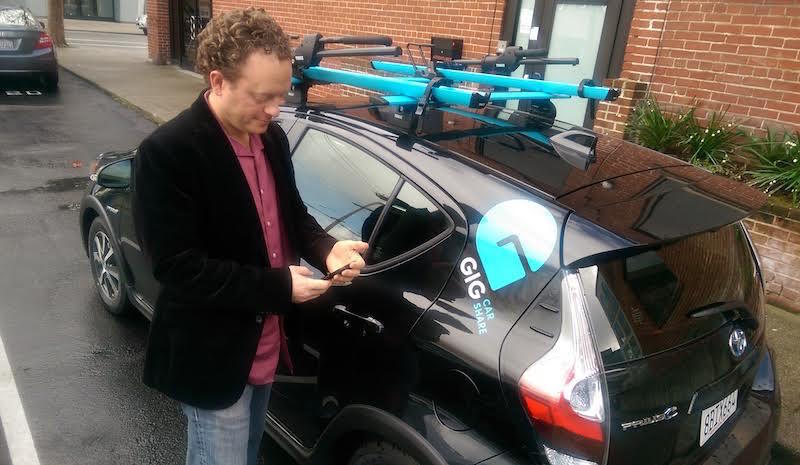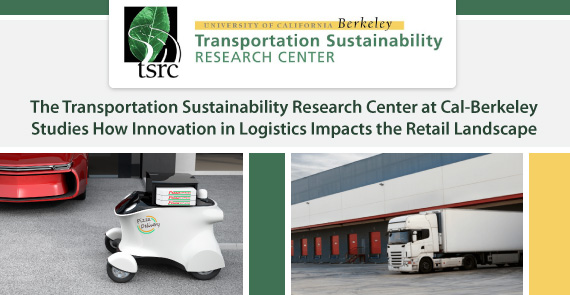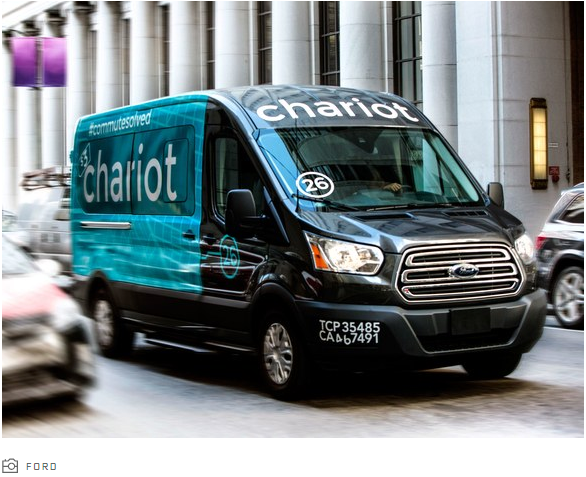
by Innovative Mobility Research | Jan 30, 2018 |
January 30, 2018 By: Eli Wirtschafter Zipcar. Ford GoBikes. Scoot. Shared vehicles are multiplying like rabbits in the Bay Area. Just this month, a company called JUMP rolled its electric bikes onto San Francisco streets. And in Oakland and Berkeley, Gig Car Share, the first “one-way” car share service in the Bay Area, is doubling its fleet of black Priuses from 250 to 500. The service, operated by AAA, has hopes to expand to nearby cities, including San Francisco. KALW’s transportation reporter Eli Wirtschafter talked with Crosscurrents host Hana Baba about the rise of vehicle sharing in the Bay Area. Listen to the full story...

by Innovative Mobility Research | Jan 12, 2018 |
December 12, 2017 By: Jon McDonald With the rise of e-commerce and the development of self-driving vehicles, both retail and transportation are fundamentally changing. The University of California Berkeley Transportation Sustainability Research Center (TSRC) is continuously monitoring those changes with a focus on how the retail industry relies on transportation. The TSRC team researches solutions to help industries, policymakers, investors, and innovators address inefficiencies in their operations and promote sustainability. By researching emerging technologies, the research center is able to offer insights into how transportation affects consumer shopping behavior and merchandise delivery. Even when Adam Cohen buys socks, he’s studying how the retail and transportation industries affect one another. He’s also looking for improvements that promote efficiency and sustainability. Adam is a research associate with the University of California Berkeley Transportation Sustainability Research Center, and he talked to us about his recent experience buying six pairs of socks online. In the old days, buying six pairs of socks meant one trip to the mall. Today, online ordering means convenience, but not necessarily efficiency. Adam was able to buy six pairs of socks in one online order, but each pair shipped from a different warehouse and was delivered in a separate UPS package. Read the Full Article...

by Innovative Mobility Research | Jan 5, 2018 |
Jan. 4, 2018 WASHINGTON — Susan A. Shaheen, co-director, Institute of Transportation Studies’ Transportation Sustainability Center, University of California (UC), Berkeley; adjunct professor, Civil and Environmental Engineering Department, UC Berkeley; and faculty scientist at the Lawrence Berkeley National Laboratory, is the 2017 recipient of the Roy W. Crum Award for her distinguished achievements in transportation research. Named for Roy W. Crum, who served as the Transportation Research Board’s executive director from 1928 until his death in 1951, TRB’s Crum Award recognizes outstanding leadership in transportation research or research administration. Shaheen will accept her award on Jan. 10, 2018, at the 97th TRB Annual Meeting in Washington, D.C. Shaheen is an internationally recognized leader in research on shared mobility and environmentally friendly transportation. Her research has broken new ground in carsharing, bikesharing, and shared-ride services for more than two decades. She has also advanced sustainable transportation research in the areas of smart parking management for public transit and trucks; ecorouting for private vehicles and freight; fuel cell, electric, and plug-in hybrid vehicles and infrastructure; smart cities; and older mobility. She has authored 60 journal articles, more than 120 reports and proceedings articles, nine book chapters, and co-edited two books. Read the full Press Release...

by Innovative Mobility Research | Oct 25, 2017 |
By: Aarian Marshall 10.21.17 Chariot, the Ford-owned van commuter service that crowdsources its routes from passengers, is the subject of some controversy in San Francisco, the city where it was born. For its 3,000 to 4,000 daily riders, Chariot is a valuable, non-personal-car form of mass transit, a cost-effective-ish alternative to the city’s sometimes sluggish and limited public transportation system (a rush hour ride is $5, compared to Muni’s $2.50). For others, the service’s vans are a straight-up nuisance: loudly idling near their homes, belching exhaust, double parking on already crowded streets, and hanging out stops meant for city buses. So it was with a mixture of joy and despair that San Franciscans greeted the news that Chariot had been suspended in California. (It also operates in Seattle, Austin, and New York.) Late Thursday afternoon, as rush hour bore down upon the City by the Bay, the California Public Utilities Commission yanked the service’s operating license. Chariot had failed three routine inspections by the California Highway Patrol, as officials found not all of its drivers had the right licenses to operate the company’s 14-person passenger vans. “We are committed to always providing our riders with safe and reliable service, and we comply with regulatory orders even when we disagree with them,” the company said in an email sent to riders. It’s likely Chariot will be back up and running in a few days, once it passes a re-inspection. According to California Highway Patrol spokesperson Jaime Coffee, the company requested a re-inspection on Thursday and the process began Friday morning. Assuming Chariot has nixed the drivers without proper licenses—or they’ve...

by Innovative Mobility Research | Oct 13, 2017 |
By: Susan Shaheen 11 October 2017 In recent years, a variety of social and economic forces coupled with advancements in technology have quickly given rise to shared mobility. Shared mobility—the shared use of a vehicle, bicycle, or other low-speed travel mode—is an innovative transportation strategy that enables users to have short-term access to a mode of transportation on an as-needed basis. Technological, mobility, and societal trends are having a transformative effect on cities. The growth of cloud computing, location-based services, mobile technologies, big data, and advanced algorithms are enabling the commodification of passenger mobility. The growth of shared mobility has become part of a trend that has pushed it from the fringe to the mainstream. Read the rest of the article...






